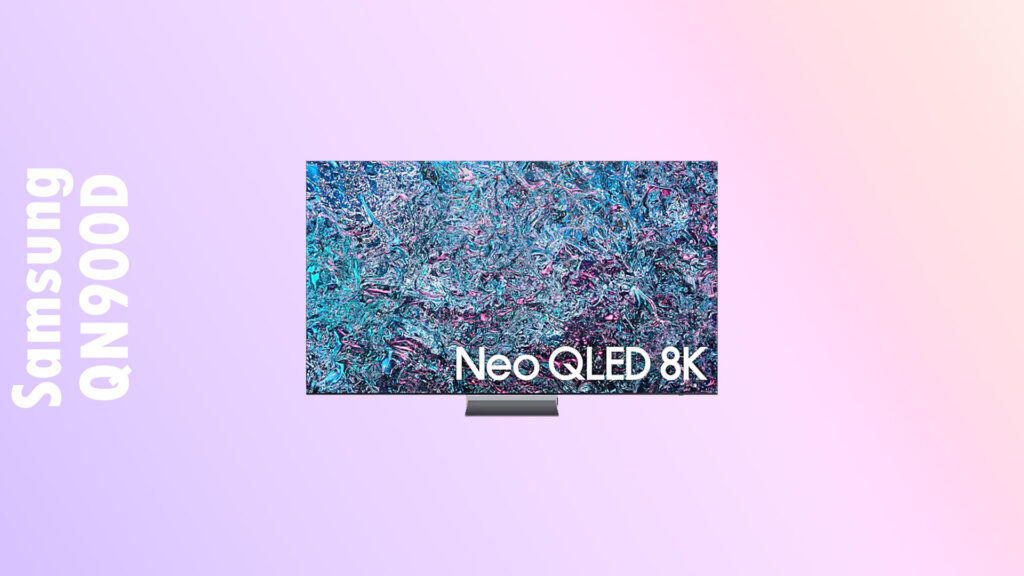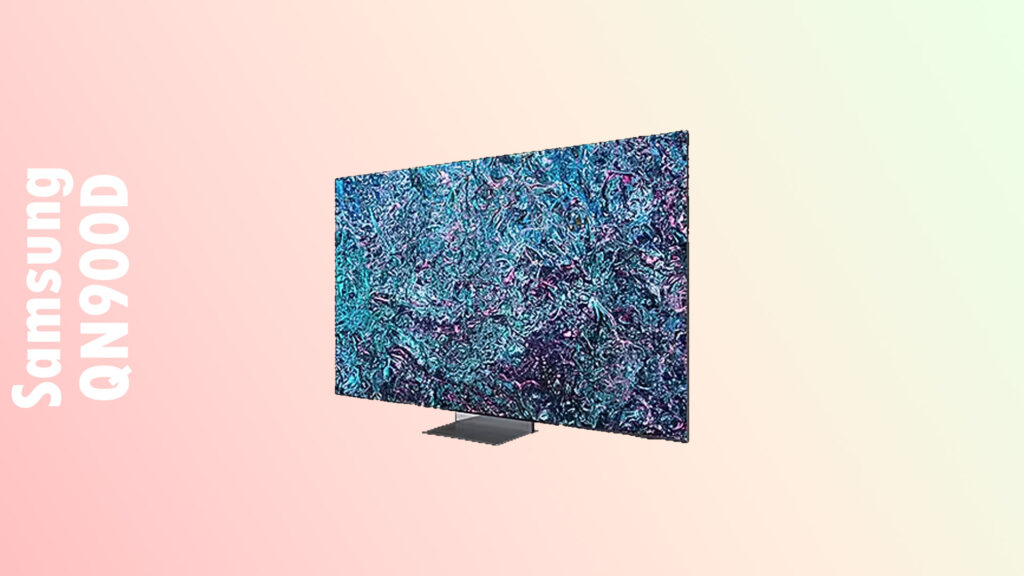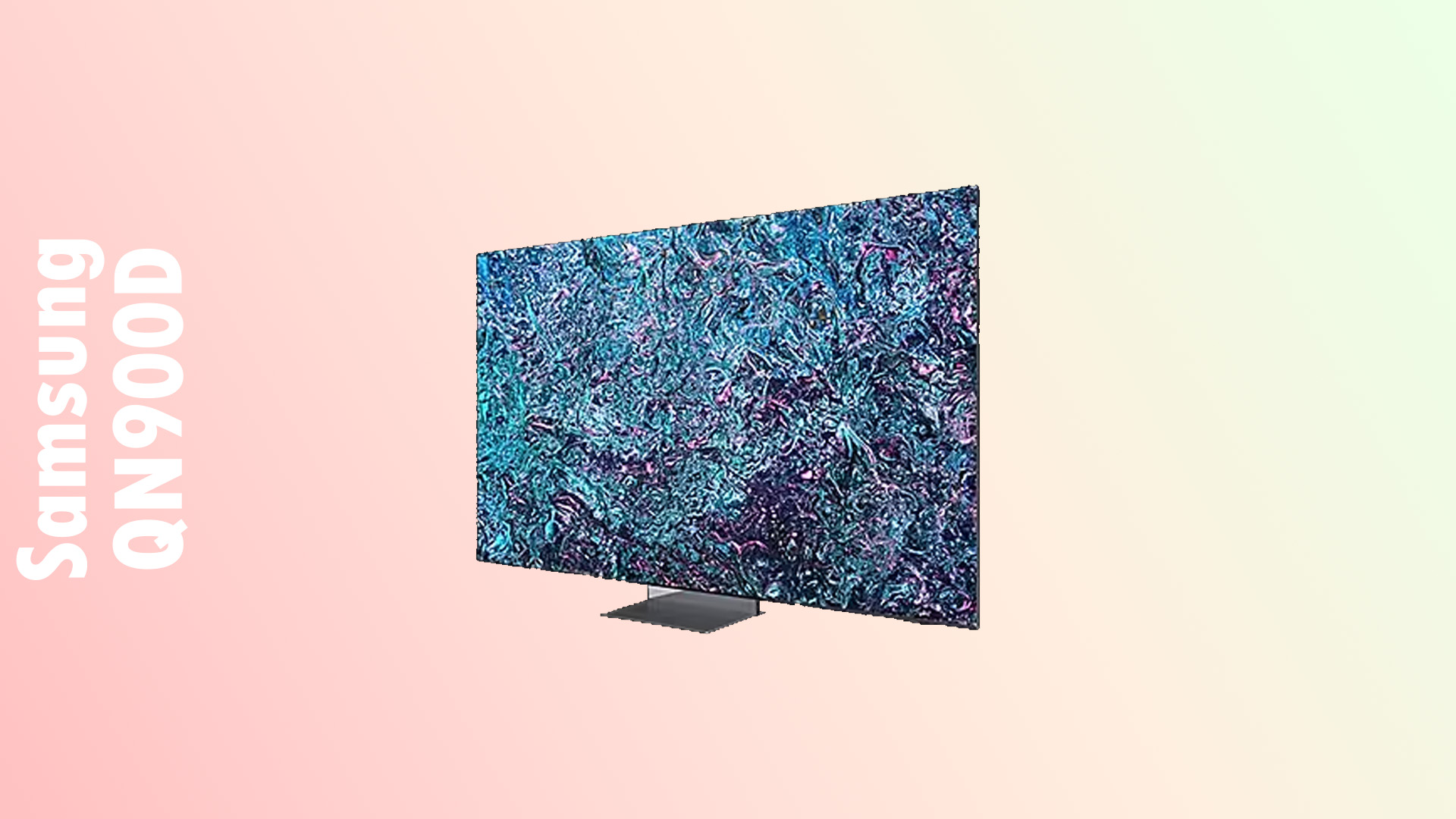Samsung QN900D, Samsung’s primary 8K version delivers vivid visuals with robust HDR accents and polished shadows. The presentation is remarkable with authentic 8K material and also demonstrates remarkable enhancement of 4K and HD-quality visuals. The sole drawback in this scenario is the expense, as the latest editions are priced significantly higher than the previous year’s QN900C series.
Pros:
- Robust luminosity
- Superior enhancement
- Sophisticated design
Cons
- Costly
- Some deterioration in picture contrast off-angle
- Connectivity problems observed on the test unit
The premier 8K television from Samsung in 2024, the Samsung QN900D, represents a notable departure from its predecessor, the Samsung QN900C mini-LED model. One significant alteration is introducing an Infinity screen design accompanied by a lustrous metal “Infinity Air Stand,” imparting a sensation of floating on air to the TV. Samsung maintains its dominant position as the foremost producer of 8K televisions, with its flagship 8K model serving as a formidable exponent for the format, which remains scarce beyond YouTube streams.
In 2024, Samsung’s lineup of 8K televisions also benefits from an updated Neural Quantum processor 8K Pro. This iteration boasts 512 neural networks, a notable increase from the previous model, equating to eight times the capacity. This enhancement brings robust AI capabilities to the new televisions, including Quantum Super Resolution Pro AI upscaling, which adeptly fills the significantly augmented pixel count of an 8K display panel compared to a 4K TV. Additionally, Real Depth Enhancer Pro, another AI-driven feature, optimizes mini-LED control to enrich contrast, even in fast-paced scenes.
AI Motion Enhancer Pro is a novel picture-processing feature exclusive to the QN900D series. Utilizing a ball-tracking algorithm, this feature enhances ball movement during sports broadcasts by leveraging information from an onboard database to meticulously fill visual gaps frame-by-frame. While I did not have the opportunity to test this feature firsthand during my experience with the QN900D, a demonstration at Samsung’s headquarters showcased its remarkable efficacy.
The QN900D series is currently open for pre-orders in 65-, 75-, and 85-inch screen variants, with pricing commencing at $4,999 for the 65-inch model, scaling up to $7,999 for the 85-inch iteration. This marks a substantial increase compared to last year’s flagship 8K TV, which initially retailed at $3,999. For additional context regarding pricing, Samsung’s leading 4K TV series for 2023, the Samsung QN90C, debuted at $2,299 for the 65-inch model.
The slim profile of the QN900D’s display owes itself to the One Connect box, featuring a redesigned, more compact form factor and incorporating four HDMI 2.1 ports. These ports support up to 4K 240Hz VRR, catering to gaming enthusiasts and representing a first for consumer TVs. Furthermore, the 85-inch variant, which I had the opportunity to test, boasts a 6.2.4-channel speaker system delivering 90 watts of power. This setup includes support for Object Tracking Sound+ to synchronize sound effects with onscreen action, along with Q Symphony functionality for seamless integration with compatible Samsung soundbars.
As previously mentioned, the QN900D’s One Connect Box houses four HDMI 2.1 inputs with support for up to 4K 240Hz, rendering it an excellent choice for gaming. Mirroring other Samsung TVs, it features Samsung Gaming Hub, a centralized platform for accessing games from connected consoles, and various cloud gaming services, such as Xbox, Nvidia GeForce Now, Utomik, Luna, and Boosteroid. The Gaming Hub now offers personalized customization options, and Samsung’s on-screen Game Bar menu introduces an AI Auto Mode, automatically adjusting picture and sound settings based on the genre of the game being played.

Visual Performance
Upon selecting the Movie preset on the QN900D – typically regarded as the most precise picture mode on Samsung TVs – I commenced my assessment by streaming 8K nature clips from YouTube. In this setting, the 85-inch model utilized for my hands-on evaluation exhibited remarkable luminosity, rendering landscapes, mosques, lizards, sloths, and humans with exceptional clarity and sharpness across the screen. While I had already been impressed by the handling of actual 8K content on last year’s QN900C, the presentation was notably superior on the QN900D.
Given the current scarcity of 8K source material, the majority of content viewed on the QN900D will likely be in 4K or HD resolution. Samsung’s premier TV adeptly upscaled 4K and lower-resolution sources to fit the 8K display. Assessing the demonstration reel on the Spears & Munsil Ultra HD Benchmark 4K Blu-ray test disc, a scene featuring slender trees on a beach exhibited an impressive level of intricate detail in the branches and rocks, devoid of any artificial-looking enhancements. Even upon close inspection, the image remained solid and detailed, a consistency observed across several discs I examined.
The QN900D’s local dimming function also proved commendable, effectively balancing powerful HDR highlights with deep, nuanced shadows. Although my evaluation did not encompass a wide range of reference movie clips, instances of backlight blooming, a common issue in some scenarios, were notably scarce on my customary test materials. While it may be premature to make a definitive assessment based solely on hands-on testing, this year’s Samsung flagship boasts the most refined local dimming implementation I’ve encountered on a mini-LED TV thus far.
Regarding metrics, although a comprehensive set of measurements was not conducted during the hands-on evaluation, the peak brightness on a 10% window in Filmmaker Mode reached 2,338 nits, while a 100% window measured 520 nits. These figures represent a notably higher peak brightness compared to the 2,000 nits measured on last year’s QN900C. Coverage of the UHDA-P3 color space stood at 92%, with BT.2020 coverage at 68%.
Samsung’s 8K TV unequivocally excels in critical aspects of picture quality; however, my evaluation did reveal certain imperfections. Screen glare posed a notable issue when ambient overhead lighting was present in the room, as did off-axis uniformity, which resulted in diminished picture contrast and color saturation when viewed from non-central seating positions. Additionally, noticeable judder and motion blur artifacts were observed during the screening of a reference scene from the James Bond film No Time to Die, though these could potentially be mitigated through custom adjustments in the TV’s Motion menu.
Of greater concern during my evaluation was the emergence of a ‘sparkling’ artifact when utilizing 4K Blu-ray as a source. This manifested as a random pattern of uniformly colored pixelation noise visible in darker images, persisting even after swapping out multiple discs, HDMI cables, and 4K Blu-ray players. Samsung later confirmed that the issue was isolated to the specific unit tested and that the sparkling artifact was not evident after the TV’s One Connect box was replaced.

Considering 8K?
Samsung’s premier 8K television is undeniably remarkable. Every aspect of the QN900C, from its aesthetic design to its immaculate visuals with both 4K and 8K content, captivated my attention. Unfortunately, connectivity issues arose with the 4K Blu-ray during my assessment; otherwise, I would readily endorse it without reservation. Presently, any definitive judgment is contingent upon testing a flawlessly operational unit.
Year after year, Samsung enhances its 8K upscaling capabilities, and with the QN900D, it has reached a stage where the distinction between real 8K and upscaled content is almost negligible due to the outstanding quality. However, the cost associated with this enhancement is a different matter, particularly considering that top-tier televisions in the market also deliver exceptional picture performance. Samsung’s substantial price hike for its 8K televisions in 2024 adds to the dilemma, but I am confident that purchasers of the QN900D will find great satisfaction in their investment.

Leave a Reply